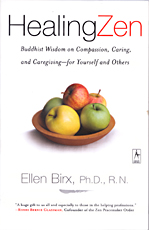Ellen Birx is a nurse and professor in the School of Nursing at Radford University, Virginia. She became a Zen teacher under Roshi Robert Kennedy and Roshi Bernie Glassman. The cofounder of the New River Zen Community, she frequently lectures to patients, Zen students, health professionals, and the general public. She is a wife, mother, and grandmother.
With great skill and finesse, Birx relates Zen to health and healing. She makes wonderful use of ancient stories, sayings, and verses from three classic koan collections. Whether you are struggling with a health crisis, recovering from one, or just trying to cope with the everyday challenges and crises of life, this astute work is bound to lift your spirits.
Simplicity is an essential part of Zen practice. Anyone who is familiar with Japanese flower arrangements or the care put into the preparation of a single cup of tea knows what she is talking about. Zen practice requires a certain awareness, which is brought to sitting, breathing, walking, and all aspects of living. Paying close attention to what is going on inside us and around us is crucial in our care-taking efforts. One of our favorite passages is this one:
"Zen Master Zuigan worked very hard every day to wake up and pay attention. Each day he called himself, 'Master!' He answered himself, 'Yes!' Then he called out to himself again, 'Thoroughly awake! Thoroughly awake!' He answered, 'Yes! Yes!' "
Those who are gravely ill are forced to come to terms with mystery. Birx quotes this Zen verse for them:
"Moonlight reflected in the bottom of the pond is bright in the sky:
The water reaching to the sky is totally clear and pure.
Though you scoop it up repeatedly and try to know it,
Vast, clarifying all, it remains unknown."
Not knowing is a liberating way of being. Birx refers also to the Zen saying, "Not knowing is the most intimate." This is a profound truth for all who work with the dying. Husbands and wives could also use this phrase as a mantra and derive great pleasure from it.
In a superb chapter titled "Acceptance: Things Just As They Are," the author notes that this spiritual practice frees us to be a healing presence in the world. It happens when we are responding to what lies in front of us and not trying to control the future. Sharing our whole self with others becomes possible when we have become intimate with ourselves. "Taped to my refrigerator is a quote by Maezumi Roshi that I cut out of a Zen Center of Los Angeles newsletter years ago. It means as much to me today as it did when I first read it. It says: 'In your daily life, please accept yourself as you are and your life as it is. Be intimate with yourself . . . I want you to take good advantage of every chance you have to become a really intimate being.' When you are intimate with yourself, you accept and get to know who you really are deep down. When you are intimate with others you feel free to share who you really are and to say what you think. Roshi Kennedy speaks of the beautiful undefended self." This is a truly nurturing book!
